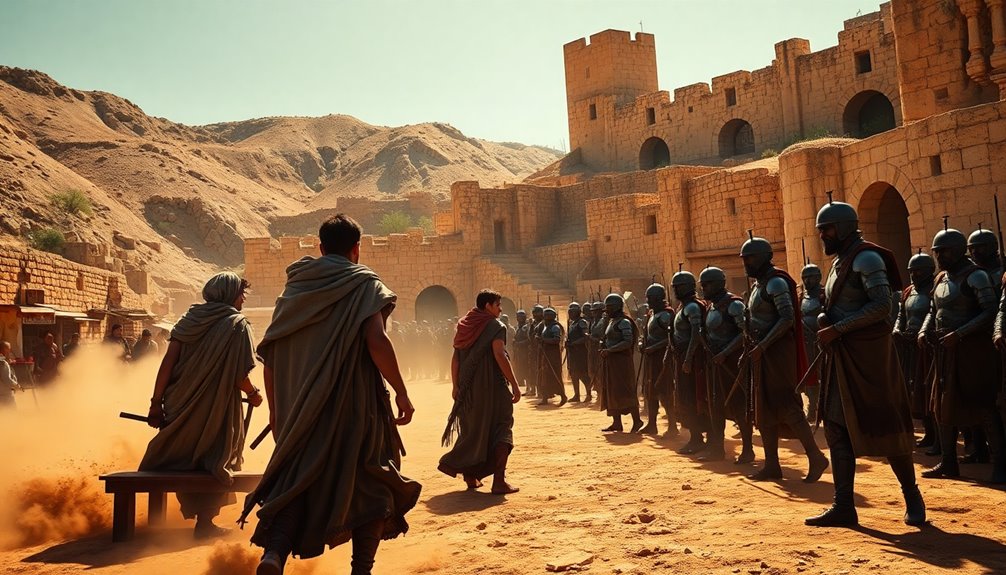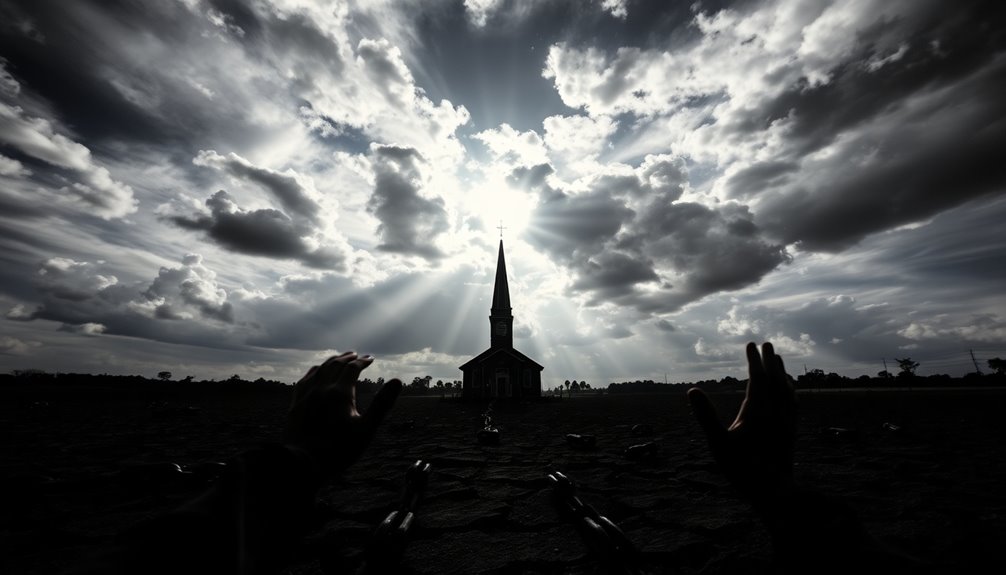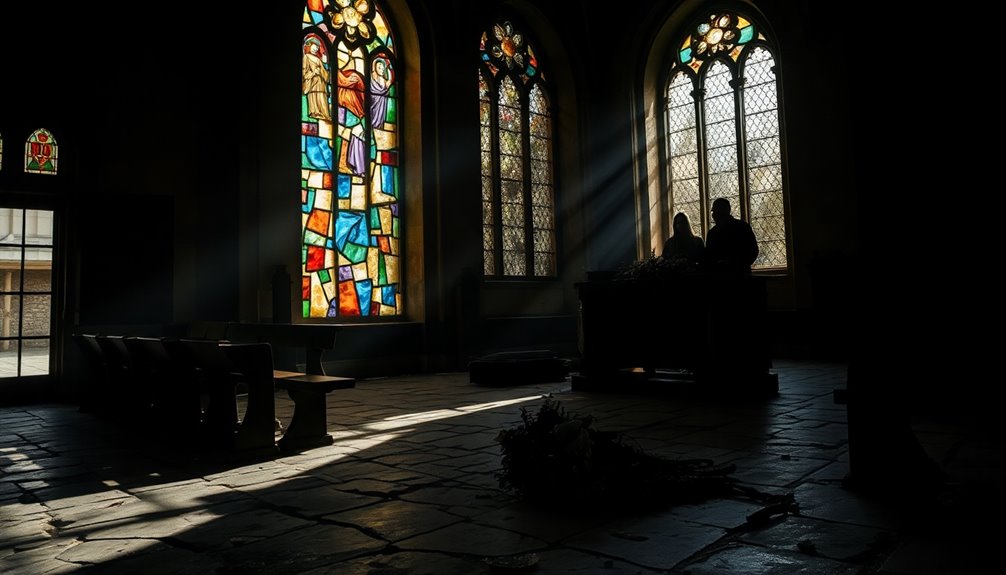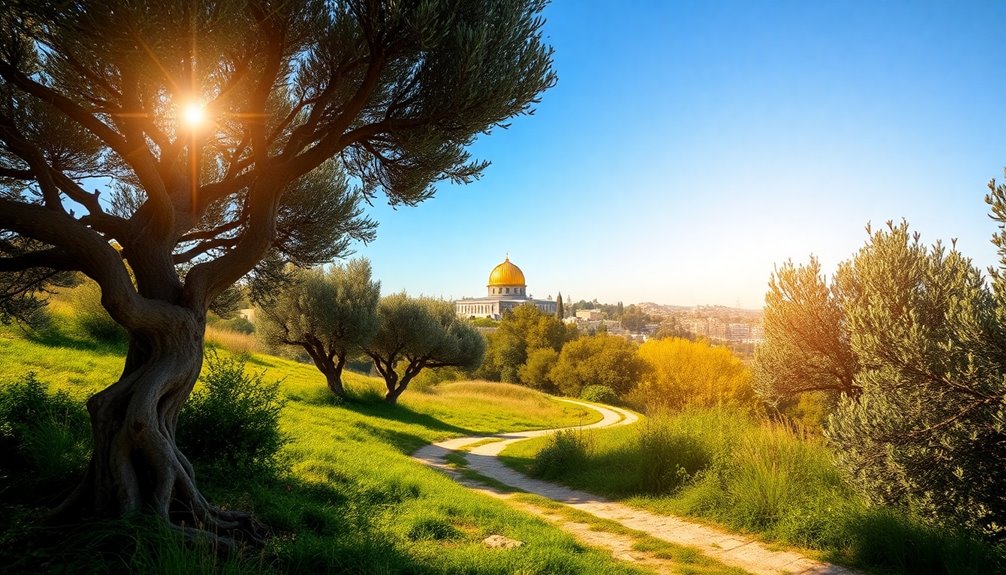When you hear "the Kingdom of God suffers violence," it's a call to passionately pursue your faith. This phrase highlights the urgency and commitment needed to engage deeply with God's purpose amid spiritual struggle. It doesn't suggest physical aggression but rather an active and determined stance toward spiritual growth and justice. Believers are encouraged to confront challenges head-on, responding to injustices in their communities. By embracing this fervor, you embody the passion of early followers of Jesus. Exploring this concept further reveals how it shapes your journey toward faith and community impact.
Key Takeaways
- "The Kingdom of heaven suffers violence" emphasizes an urgent and active pursuit of faith rather than physical aggression.
- The Greek term "biazetai" indicates enthusiastic engagement required to enter the Kingdom, reflecting the importance of determination.
- Historical tensions in first-century Judean society shaped the reception of prophetic messages and the urgency of faith pursuits.
- Active community engagement and justice initiatives embody Kingdom principles, reflecting Jesus' teachings on caring for the marginalized.
- Believers are called to passionately pursue justice and mercy, moving beyond mere belief to collective action for systemic change.
Introduction

In the heart of Jesus' teachings, the phrase "the kingdom of heaven suffers violence" captures the passionate urgency of those yearning to enter this divine realm. Since the days of John the Baptist, individuals have demonstrated a fervent commitment to pursuing the kingdom of God. This concept of violence isn't about aggression; it's a figurative expression of the intense, forceful pursuit required from believers. John the Baptist's ministry ignited this urgency, calling people to repentance and proclaiming the imminent arrival of the kingdom.
As you engage with this idea, remember that the historical context is filled with challenges. The prophets faced persecution, and ultimately, Jesus himself was crucified—demonstrating the reality of spiritual warfare. This backdrop illustrates the resistance believers encounter while striving for a deeper connection with God.
Various translations of Matthew 11:12 emphasize that "violent men take it by force," highlighting the proactive nature of faith. You're invited to join this passionate pursuit, recognizing that entering the kingdom of heaven demands determination, commitment, and an unwavering heart.
It's a journey marked by urgency, urging you to embrace the call of Jesus and the prophets who paved the way.
Scriptural Basis for Violence

When you look at Matthew 11:12, you'll see that it presents a powerful picture of the kingdom's urgency and the fervor of those pursuing it.
This verse, along with others, highlights how believers have historically engaged in a passionate quest for their place in God's kingdom.
Exploring both primary and secondary Bible references will help clarify what this "violence" truly means in the context of faith.
Primary Bible References
Scripture offers profound insights into the concept of violence within the context of the Kingdom of God, particularly in Matthew 11:12. The passage states, "From the days of John the Baptist until now, the kingdom of heaven suffers violence, and the violent take it by force." This highlights the eagerness of individuals who actively pursue the gospel of the kingdom.
The term "violence" here isn't about physical aggression; it reflects the fervent enthusiasm of eager men striving to enter the kingdom. The Greek word "biazetai," translated as "suffers violence," emphasizes that entering the kingdom requires determination and effort.
Various translations, like the ESV and NKJV, reinforce this notion of "violent men" seizing the kingdom. This proactive approach to faith is essential for achieving spiritual goals. Since John the Baptist's ministry, the kingdom has faced opposition and persecution, marking a struggle for advancement amidst societal and religious challenges.
Ultimately, pursuing the kingdom, as taught through the Law and the Prophets, is a call to action. In Christ Jesus, you're invited to join this dynamic pursuit, embracing the transformative journey it entails.
Secondary Bible References
Understanding the scriptural basis for violence within the Kingdom of God reveals a complex journey filled with challenges and opposition.
Jesus reminds us in Matthew 5:10-12 that those who face persecution for righteousness are blessed, highlighting the violence believers often encounter. John the Baptist faced his own struggles, and in Acts 14:22, Paul and Barnabas encourage you to embrace tribulations as part of entering the kingdom. This underscores the reality that your faith journey is marked by struggle.
In Revelation 12:11, you find hope as believers overcome the accuser through the blood of the Lamb and their testimony, showcasing the spiritual warfare integral to advancing the kingdom.
The parable of the sower in Matthew 13:18-23 illustrates that resistance is common; the word of the kingdom will face challenges and opposition. Ephesians 6:12 further emphasizes that your struggle isn't merely against flesh and blood but against unseen spiritual forces.
This understanding equips you to recognize that the violence faced in the spiritual realm is part of your heavenly calling, empowering you to overcome and stand firm in faith.
First-Century Judean Society Dynamics

First-century Judean society was a volatile tapestry woven from Roman political control and local Jewish religious authority. This complex interplay created significant tensions, especially as the Pharisees and Sadducees clashed over governance and spirituality. The Pharisees emphasized adherence to the oral law and ritual purity, while the Sadducees, holding power in the Temple, rejected these traditions.
Amidst this backdrop, social stratification was stark. Wealthy elites, peasants, and marginalized groups, including tax collectors and sinners, influenced how prophetic messages, like those from John the Baptist, were received.
You'd find that many were stirred by the growing Messianic expectations, hoping for a political Messiah to liberate them from Roman oppression.
As you navigate this society, you'll notice how the anticipation of the Kingdom of God shaped the community's responses to figures like John and Jesus. The importance of the Temple in Jerusalem and the practice of ritual purity formed the foundation of daily life, impacting the spiritual landscape as it prepared the way for the transformative message of the Kingdom of God.
Historical Context of Violence

In the tumultuous landscape of Judea during John the Baptist's ministry, violence became an unsettling reality, marking the struggle between emerging spiritual authority and established religious powers. The phrase "the kingdom of heaven suffers violence" captures the intense opposition John faced from the Pharisees and other entrenched leaders who resisted his radical call for repentance. This resistance not only led to John's imprisonment but also foreshadowed the persecution that would follow Jesus' proclamation of the kingdom.
As excitement built around the anticipated Messiah, crowds flocked to John, eager for baptism and teachings. Their fervor resembled an invading army, a powerful force challenging the status quo. However, this enthusiasm met fierce backlash from those in power, resulting in violent reactions against the new message.
The ongoing spiritual warfare faced by believers during this time illustrates the dual struggle of navigating external hostility while maintaining faith amid adversity. The violent men opposing the kingdom weren't just a historical reality; they represent the persistent challenges that believers confront even today.
This historical context helps you grasp the depth of conflict inherent in the kingdom of heaven's advance.
Misunderstanding "Violence" in Context

You might be surprised to learn that the "violence" mentioned in Matthew 11:12 doesn't refer to physical aggression but to the passionate pursuit of the Kingdom of Heaven.
Misunderstanding this term can lead to serious misconceptions about the nature of faith and the actions it inspires.
Let's explore how these interpretations can shape your understanding of spiritual fervor versus physical conflict.
Debunk Common Misconceptions
Many people mistakenly interpret the phrase "the kingdom of heaven suffers violence" as indicating some form of physical aggression toward the kingdom. In reality, this verse from Matthew 11:12 highlights the enthusiastic and forceful pursuit of the kingdom by eager believers.
The Greek word "biazetai," often translated as "suffers violence," emphasizes the urgency and fervor of individuals striving to enter the kingdom. This is about passionate responses to the messages of John the Baptist and Jesus, not an indication that violent men seize the kingdom through aggression.
Misinterpretations can lead to ethical issues, as they may justify violence in religious contexts, detracting from the intended message of humility and earnestness in faith.
Instead of viewing this passage as depicting an attack on the kingdom, consider it a call to proactive and assertive actions in your spiritual pursuit. Recognizing that the kingdom of heaven isn't under siege but is instead an invitation to those who earnestly seek its blessings can transform your understanding.
Embrace this perspective, and you'll find that the true essence of the kingdom is about a passionate journey rather than conflict.
Misinterpretation of Biblical Violence
While some might perceive the term "violence" in biblical contexts as an indication of physical harm, it actually conveys a deeper meaning tied to spiritual fervor and determination. In Matthew 11:12, the phrase "the kingdom of heaven suffers violence" reflects an active pursuit by believers eager to enter the kingdom, not a depiction of aggression. The Greek term "biazetai" highlights this urgency, emphasizing the enthusiastic response of those drawn to the teachings of John the Baptist and Jesus.
Misinterpretation of this phrase can lead to a skewed understanding, suggesting that the kingdom is under attack rather than showcasing the fervent commitment of individuals seeking spiritual advancement. This misunderstanding diverts attention from the true message: that the path to the kingdom requires passionate involvement and effort.
Various translations of Matthew 11:12 reveal different nuances of the term "violence," underscoring the necessity of careful interpretation.
It's essential to recognize that the violence mentioned isn't about hostility but rather about the intensity of spiritual eagerness, which propels individuals toward a deeper relationship with God. Embracing this perspective enriches your understanding of biblical teachings.
Faith-Driven Community Engagement

When you engage in faith-driven community initiatives, you're actively pursuing justice and making a real impact in your neighborhood.
By participating in outreach programs, you not only support the marginalized but also embody the principles of the Kingdom of God.
Your commitment to collective action can inspire others and foster a strong community dedicated to justice and unity.
Active Pursuit of Justice
Active pursuit of justice in the Kingdom of God calls you to engage deeply with your community, reflecting the heart of Jesus' teachings.
You're invited to embody justice and mercy by actively advocating for those facing oppression. Jesus emphasized love for neighbors and caring for the marginalized, reminding you that your role is to seek equity and righteousness in all interactions.
The early church demonstrated faith-driven community engagement by sharing resources and caring for the poor, setting a precedent for your involvement today.
As you participate, remember the biblical call from Micah 6:8 to "do justice, love kindness, and walk humbly with God." This pursuit isn't just about addressing immediate needs; it's about transformation and the restoration of societal structures that perpetuate inequity.
You're encouraged to be a voice for the oppressed, embodying the prophetic vision of a Kingdom characterized by righteousness and equity.
Speak out against systemic injustices, and engage with your community in meaningful ways. Your actions can lead to a more just society, reflecting the values of the Kingdom of God and fostering an environment where all can thrive.
Community Justice Initiatives
Community justice initiatives embody the heart of faith-driven engagement, focusing on systemic issues that impact underprivileged groups. You'll find that these programs often mobilize resources and volunteers from local congregations to provide vital legal assistance and advocacy for marginalized individuals. By doing so, faith-based organizations aim to protect rights and promote social equity within the community.
Many churches partner with local governments and nonprofits, creating holistic strategies that address crime prevention and rehabilitation. This collaboration fosters safer neighborhoods, where community justice isn't merely about punishment but about healing and restoration.
Emphasizing restorative justice principles, these initiatives encourage dialogue and reconciliation between offenders and victims, promoting healing rather than retribution.
As a result, faith communities involved in these justice initiatives report increased social cohesion and improved relationships among diverse community members. By engaging in these efforts, you contribute to a community that values justice, equity, and healing.
In doing so, you become part of a broader movement that seeks to address the systemic issues affecting your neighbors, fostering a more just and compassionate society for all.
Seize the Kingdom Actively

Seizing the Kingdom of God requires more than mere belief; it demands a passionate pursuit. The phrase "the kingdom of heaven suffers violence" highlights the intense eagerness of "violent men" who actively chase entry into this divine realm. Just as John the Baptist ignited fervor among crowds, you too should embody that same urgency and excitement as you pursue God's will.
Active engagement is essential; you can't sit back and wait for the Kingdom to come to you. The Greek word "biazetai," meaning "suffers violence," suggests that seizing the Kingdom requires forceful action and determination.
Look at the biblical examples, like those who tore through roofs to reach Jesus (Luke 5:18-19), which illustrates the necessity of proactive faith.
To enter the Kingdom, you must demonstrate a commitment that goes beyond simple repentance and faith. Embrace a vigorous pursuit of God's purpose in your life.
Additional Resources

Numerous resources are available to help you deepen your understanding and pursuit of the Kingdom of God. To grasp the concept that the kingdom of God suffers violence, you can start by exploring Matthew 11:12, where Jesus highlights the fervent enthusiasm since John the Baptist's time. This verse illustrates how violent men try to press on toward the Kingdom with earnest effort.
Consider books and commentaries that delve into the Greek terms "biazetai" and "harpazousin," which emphasize the proactive approach required for spiritual advancement. Engage with sermons or teachings that discuss the nature of spiritual warfare, as understanding these battles will help you navigate your internal struggle in claiming God's heavenly calling.
Additionally, joining study groups or community discussions allows you to share insights and experiences with others who feel the urgency of this pursuit. Online courses or podcasts focused on the themes of passionate pursuit and the challenges of faith can also enrich your journey.
Frequently Asked Questions
What Does the Kingdom of God Suffers Violence Mean?
When you hear "the kingdom suffers violence," it's about the fervent pursuit of spiritual truth and belonging.
It reflects the passionate efforts of individuals like you who actively seek a deeper connection with God. This phrase emphasizes your determination and urgency in overcoming obstacles.
It's not about physical aggression but rather your assertive approach to embracing faith and salvation, highlighting the challenges you face in your spiritual journey.
Is the Kingdom of Heaven Taken With Violence?
You might wonder if the Kingdom of Heaven is taken with violence. The phrase suggests that entering this Kingdom requires a vigorous, determined effort on your part.
It's not about physical aggression but rather a passionate pursuit of spiritual commitment. You're encouraged to actively seek the Kingdom, showing urgency and dedication.
This journey demands your assertiveness and readiness to face challenges, reflecting the intensity of your desire to be part of God's Kingdom.
What Does Matthew 11 12 Mean?
Matthew 11:12 highlights the passionate pursuit of the Kingdom of Heaven since John the Baptist's time.
You see, it's not about physical violence but rather the intense eagerness of individuals striving to enter this spiritual realm.
It shows that true believers actively press into their faith, demonstrating a strong desire to embrace God's promises.
This verse embodies the urgency and determination required to seek the Kingdom amidst life's challenges.
What Does Matthew 11:14 Mean?
Matthew 11:14 identifies John the Baptist as the prophesied Elijah. When you recognize John's role, you're acknowledging the fulfillment of God's promise about the Messiah's arrival.
This verse highlights the urgency of John's message of repentance, urging you to prepare for Jesus. By accepting John's ministry, you're embracing the transformative nature of God's kingdom and the significant shift it brings to human history, as foretold by the prophets.










